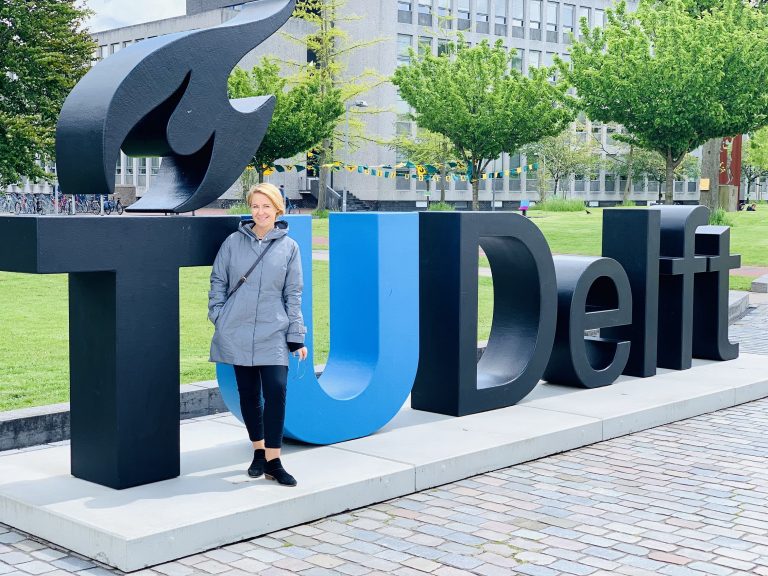Natalia Barbour is one year into her tenure track at TU Delft and she, again, has some lessons to share. She wrote this letter. “True impact does not often have an h-index.”
“There is no rhyme or reason to giving a successful lecture.” (Photo: Justyna Botor)
I once read that tenure tracking is getting used to the feeling of being completely overwhelmed. On another occasion, I read that tenure tracking and academic freedom mean the best job in the world. So which one is it? Is it both or neither?
I started my quest as an assistant professor exactly one year ago. I first worked in the USA and over the summer of 2021, I moved to the Netherlands. It was not only a new job but a new country, new language, and new friends – a do-over in a way. Moves are never easy and transatlantic moves seem impossible. The ongoing pandemic mixed with persistent imposter syndrome that is very common among academics were perfect ingredients to either fight or flee, or just be flexible. A year into academic life, I can assure you that I found the most comfort in the latter.
‘The only possible way not to fail is not do anything new’
Flexibility in seeking challenges, teaching, communication, and student advising has been a saving grace. Remaining open and responsive to opportunities while actively trying to navigate the direction of your career is at the core of your junior years. Although the challenges are likely to be similar for many, academia is by no means one size fits all because the moment you climb a very steep learning curve, you hit reset and another climb awaits you around the corner. The momentum you gain from climbing to the top of the curve is immediately lost by a brand new and unforeseen grounding moment which forces you to pause and admire the ocean of knowledge and high level of expertise of your peers. Despite the journey sounding a bit like a roller coaster, it is a path that forces continuous improvement and polishing one’s craftsmanship.
Teaching has been one the most unanticipated things as it is not solely dependent on your preparation, knowledge, or the type of content but rather is fully reliant on the connection with your audience. Building a strong connection cannot be rehearsed or staged as its roots are often raw and organic. There is no rhyme or reason to giving a successful lecture because every day is unique, every audience distinct, and every opportunity to interact with brilliant students teaches you something new so at the end of the day you evolve together. The process requires humility, patience, and courage from everyone involved.
Fear of failing has been a common denominator in many academic activities and is universal among staff and students. But can success and progress even be possible without failure? And is failure really a failure if you learned something new? The only possible way not to fail is not do anything new. Not living up to your full potential while being unapologetically authentic to yourself is the only failure we should fear. Everything else is elastic and fixable.
‘Remaining true to who you are is hard but necessary’
If there is one lesson that early tenure tracking teaches and that is worth sharing is the one on authenticity. Remaining true to who you are and who you always have been is hard but necessary. Ultimately, your authenticity gives you confidence to determine your direction, drives your instincts, and helps you cope with failure while minimising regret. It is really the only thing that is left, aside from intellect of course, that can transform careers and build strong foundations for relationships. It is a driving force and passion that allows you to complete never ending to-do lists. Its energy is unlimited, and its bravery is natural.
Tenure tracking has shown me many of its faces and allowed me to find more dimensions than I expected in the first year. I compiled them into a short dynamic list. Short because it is not possible to go in many different directions at once, and dynamic because it is constantly evolving and I would consider it a failure if next year it remained the same because it would mean I did not fail and I did not learn.
- Be inspired by others but do not ever compare yourself to others. True impact does not often have an h-index.
- An academic career is not a marathon but a series of sprints where rest is as vital as exertion.
- Given new information, change your mind often and change it wisely.
- Give the benefit of the doubt to everyone and particularly to yourself.
- Time is your most valuable commodity so you should decide how to spend it, not anyone else.
- Always be a part of the solution and not the problem.
 (Photo: Worth Barbour)
(Photo: Worth Barbour)Natalia Barbour is Assistant Professor of transport + energy at the Faculty of Technology, Policy and Management. You can learn more about her research here or connect with her on Twitter: @natalia_barbour.
Also read her first letter on our website: Tenure tracking during Covid-19: lessons from a newbie
Opinion / Our platform is open to well written and well argued opinion articles written by students and employees of TU Delft. The maximum word count is 700. Email us at delta@tudelft.nl.


![[Letter] Lessons from a tenure tracker: on authenticity and much more](https://delta.tudelft.nl/wp-content/uploads/2023/12/StudentsLectureHall2_CEG_JustynaBotor_0.jpg)
Comments are closed.